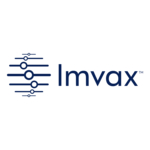
Imvax Presents New Data on Tumor-Derived Immunotherapies in Glioblastoma, Other Solid Tumors at AACR Annual Meeting 2022
– Promising preclinical findings for ovarian and hepatocellular cancers support platform applicability to multiple solid tumor types –
– Predictive model of patient response to IGV-001 for glioblastoma developed based on Phase 1b clinical findings –
PHILADELPHIA--(BUSINESS WIRE)--Imvax, Inc., a clinical-stage biotechnology company developing personalized, whole tumor-derived immunotherapies, is presenting data on the activity of the company’s tumor-derived immunotherapies in glioblastoma and other solid tumors at the American Association for Cancer Research Annual Meeting 2022 in New Orleans, La.

“Imvax has developed a unique tumor-derived immunotherapy approach that we believe has potential to extend the promising results seen with cell-based therapies in blood cancers to the more challenging category of solid tumors. The data we are presenting at AACR validates the transformative potential of our immunotherapeutic platform to multiple types of solid tumors,” said John P. Furey, Chief Executive Officer. “We are eager to continue to advance programs in gynecological, liver, and other cancers, as well as to initiate our Phase 2b clinical trial in our lead indication, glioblastoma, later this year.”
Platform applicability to solid tumors
Preclinical findings presented at the meeting support the applicability of Imvax’s platform to hepatocellular carcinoma and ovarian and other gynecological cancers. Utilizing murine models of those solid tumor types, researchers assessed survival and tumor burden of mice that underwent a tumor challenge after being pre-treated with Imvax’s tumor-derived combination therapy, consisting of tumor cells dosed with IMV-001, the company’s proprietary antisense component, and enclosed in a biodiffusion chamber (BDC). Control groups for each study were treated with saline filled BDCs. In all arms of the study, the BDCs were removed 48 hours after implantation, and the tumor challenge was then conducted 26 days later.
In the ovarian cancer model, 60% of IOV-001-treated mice were alive 58 days post-tumor challenge, compared to only 19% of mice in the control group (p=0.004). Circulating IFNγ was significantly higher in IOV-001-treated mice compared to controls on day 1 post-tumor challenge (p<0.001).
In the hepatocellular carcinoma model, 50% of IHV-001-treated mice were alive by 100 days post-tumor challenge; there were no survivors in the saline group beyond day 28 (p=0.004). Most of the long-term survivors had undetectable levels of tumors. At day 14 after tumor challenge, circulating IFNγ trended higher in mice treated with IHV-001, and PD1+ expression in both CD4+ and CD8+ T cell subsets was significantly lower (p=0.002) in those mice that would survive long-term.
Predictive model of glioblastoma patient response
Additional data presented at AACR detail the creation of a predictive model of patient response to IGV-001 based on serum profiling. The model was created utilizing data from the Phase 1b study of Imvax’s IGV-001 product candidate. That study had previously reported a median progression-free survival of 17.1 months in newly diagnosed glioblastoma patients in the highest dose cohort treated with IGV-001, compared with 6.5 months in historical standard-of-care-treated patients (P=0.0025) (Andrews et al., Clin Can Res 2021).
Inputs to the model included serum profiles of a number of cytokines as well as the methylation status of the O6-methylguanine-DNA methyltransferase (MGMT) gene promoter. An overall survival cutoff point of 21.9 months was used to dichotomize ‘good’ versus ‘poor’ outcomes. Utilizing a training subset of 10 patients, a classification decision tree was created. Applying this trained model on the full dataset (n=33) resulted in 93.9% correct classification of patients’ actual clinical outcomes. GBM-associated cytokines IL-8, IL-5, IL-6, and IL-13 were found to be key immune-correlates of patient outcomes. As these cytokines are known to correlate with tumor burden or prognosis, this observation further validated the utility of the model.
Imvax expects to utilize data from the upcoming Phase 2b trial of IGV-001 to further bolster the model’s predictive capabilities with the objective of identifying patient populations most likely to benefit from IGV-001 immunotherapy.
About Imvax, Inc.
Imvax is a clinical-stage biotechnology company with a unique platform technology focused on delivering personalized, whole tumor-derived immunotherapies across a range of solid tumors. Imvax’s portfolio includes several programs designed to stimulate a patient’s immune system against the entire antigen signature of their tumor. Imvax’s most advanced program is IGV-001 for the treatment of glioblastoma. Imvax is headquartered in Philadelphia, PA. For additional information, please visit www.imvax.com.
Contacts
Media:
Lisa Raffensperger
lisa@tenbridgecommunications.com
(617) 903-8783
Editor Details
-
Company:
- Businesswire
